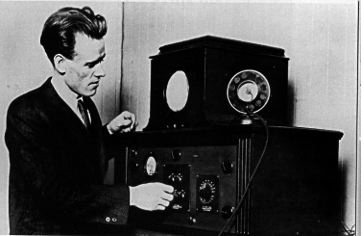Listen to me on TV CONFIDENTIAL:
February 22, 1963
Pebbles was born at the Bedrock Rockapedic Hospital.
The Flintstones Season 3 Episode
23 The Blessed Event
In 1963, when Hanna
Barbera decided to add a baby to the show, their first choice was a boy.
When Ideal Toy Company heard this, company executives
approached Hanna Barbera with a proposal to change the baby character to a girl
for which the toymaker could create a doll, and Hanna Barbera agreed.
February 25, 1928
The Federal Radio Commission issues the first
television license.
The license went
to the Charles Francis Jenkins Laboratories for a television broadcast station
on Connecticut Avenue in Washington, D.C. The station later moved to Maryland
and operated until 1932.
Government regulation of
broadcasting has been in existence almost as long as the broadcast industry
itself. The Wireless Act of 1910 required American ships to carry a
broadcasting transmitter and qualified radio operator on all sea voyages. In
the early 1920s, laws were passed governing transmission power, use of
frequencies, station identification, and advertising. The Radio Act of 1927
shifted regulatory powers from the Department of Commerce to the new Federal
Radio Commission, which became the Federal Communications Commission (FCC) in
1934.
Today, the FCC still
regulates broadcasting and communications. The U.S. president appoints its five
commissioners with the Senate's consent. The commission licenses and regulates
radio and TV broadcasters as well as other communications mediums, such as
telephone and cable television. It assigns frequencies and call signs to radio
stations and is responsible for ensuring rapid, efficient telephone and
telegraph service. The FCC also operates the Emergency Broadcast System, which
provides a vehicle for authorities to communicate with the public and
disseminate critical information immediately when national disaster strikes
(though the system can also be used to broadcast weather warnings and local
emergencies).
More
expansive policy issues under the purview of the commission include deciding
how much sex and violence is permissible on television. Deregulation of the
industry in the 1980s reduced the FCC's size from seven to five commissioners
and increased the term of radio and television station licenses. In the 1990s,
the FCC developed a television rating system, much like the one used in movies,
which helps people decide which shows are appropriate for the viewers in their
household.
Stay Tuned
Tony Figueroa



No comments:
Post a Comment